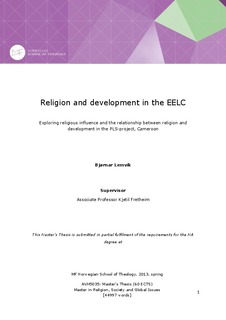Religion and development in the EELC. Exploring religious influence and the relationship between religion and development in the PLS-project, Cameroon
Master thesis
Permanent lenke
http://hdl.handle.net/11250/161419Utgivelsesdato
2013-11-21Metadata
Vis full innførselSamlinger
Sammendrag
By looking empirically at one concrete faith-based developmental initiative, the aim
of this study is to investigate the ways in which religion is present and influence
development in faith-based development work, so as to gain a better understanding of the
relationship between these concepts. Even though this assignment will focus mainly on
religious influence on development, where my material allows it, I will also comment on the
influence that development has on religion. It is important to stress that by influence, I do
not refer to any potential causal effects between the two, but the potential ways in which
they mutually nuance, challenge or redefine each other.
The project I have chosen is the Programme de Lutte contre le VIH/SIDA (PLS) run by
the Eglise Evangelique Lutherienne au Cameroun (EELC). This is a developmental project
within health, which is a core category within contemporary development discourse.
Religion is of particular interest to the health- category because of the central role played by
religious actors (Haynes 2007:172). Furthermore, this church- run project is mainly funded
through the Norwegian Agency for Development Cooperation (NORAD), through the
Norwegian Missionary Society (NMS).
